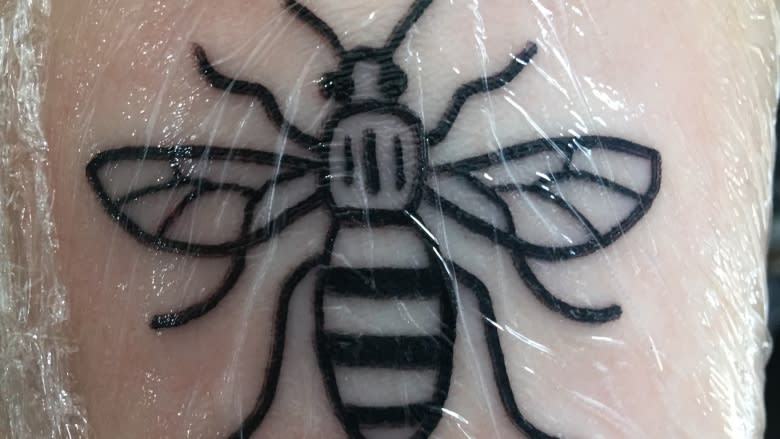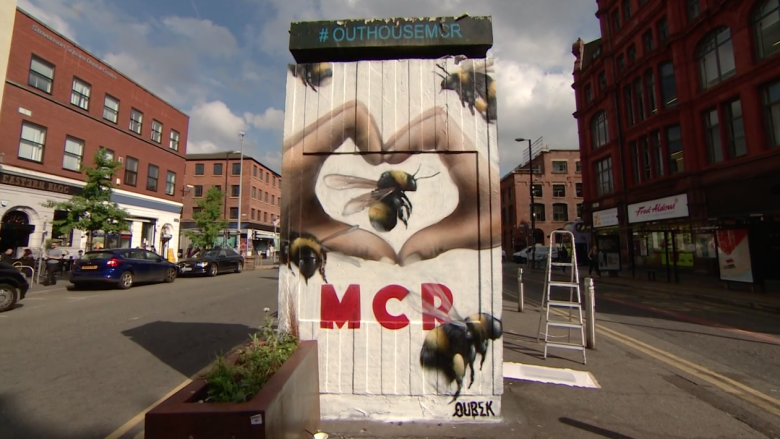Manchester tattoo parlours buzzing as people commemorate attack with ink
The Mancunian bee: striped and winged, of course, and rather simply drawn in black ink. The worker bee has been the symbol of Manchester for nearly 200 years.
This past week it was picked up and dusted off by a city racked with grief, becoming one of the most unexpected and potent symbols of defiance in the wake of the attack that shook this city to its core Monday, when 22 people, including several children, were killed by a suspected suicide bomber at a packed Ariana Grande concert.
The renaissance of the bee began in the most unlikely of places: in the city's tattoo parlours. The artists known as "ink-slingers" offered to tattoo the worker bee on those who wanted it and then donate the fee to a fund for victims of the attack.
And so the lineups at the tattoo parlours began.
"We saw the tattoo of the bee online last night and we just decided it would be a good way to raise some money for the [victims'] funds," said waitress Ashley Price as she waited for a tattoo artist to free up at Loaded Forty Four Tattoo & Piercing.
Price said she also wanted to express her solidarity with her fellow citizens.
"The bee's been a symbol of the city, and I think we just need to prove that we'll keep staying strong and keep working."
Bee dates back to Industrial Revolution
The symbol dates back to the Industrial Revolution. The northern England city of Manchester, of course, was at the heart of it, and people used to call the city's factories "beehives."
The bee was seen as an emblem of industriousness and collective effort. There are seven on the city's crest, and around town you'll find the worker bee symbol on garbage cans, lampposts and the floors and walls of civic buildings.
"Manchester people stick together," said tattoo artist Pep Curnock, who was donating his talents to the cause at Loaded Forty Four.
"We have a north-and-south divide here in England," he said. "It's not very big compared to where you come from, but we're very proud of where we come from."
Curnock views his work as a calling, something he always knew he'd do.
"People have many reasons for having a tattoo," he says when asked why people would stitch a reminder of such tragedy onto their skin.
"I think they'll look back and say 'I was a part of that,' to help the cause a little bit."
There were so many customers that Loaded Forty Four had to turn people away earlier this week, on the first day of the fundraising drive that will last through the weekend.
Long, low tables were full of people draped full-length on stomachs, backs or sides, depending on their chosen location for a tattoo.
Like any Mancunian establishment worth its salt, the parlour has The Smiths playing on its sound system — one of the city's best-loved native bands.
Lauren Walker was getting a bee on the back of her neck, her own personal way of fighting back, she explained, against the senselessness of the attack.
"It just represents how we unite and we work hard," she said above the constant drone of buzzing needles.
'Everyone else's logos are a bit rubbish'
But despite all the talk of solidarity and unity and looking after your own, the bomber identified by police was himself from Manchester, born and bred.
It's a hard thing for people to digest. "To me, he's from another planet," said Curnock.
But many in Manchester simply won't allow their own sense of self to be taken from them by what's happened.
"He's from Manchester, but that doesn't mean that he represents Manchester anymore than he represents his religion," said Arts Council England worker Michael Shoard, spotted in the centre of town wearing a bee T-shirt.
Even the street artists were doing their bit. Russell Meehan — artist moniker: Qubek — was out with his spray cans, covering one of his own previous works to paint a bee encircled by a heart.
"It's a nice metaphor for the people of the city — and it's probably the coolest logo for a city," he said. "It's like everyone else's logos are a bit rubbish compared to ours."
More importantly, it clearly means a great deal to people here. Long live the Mancunian bee.





